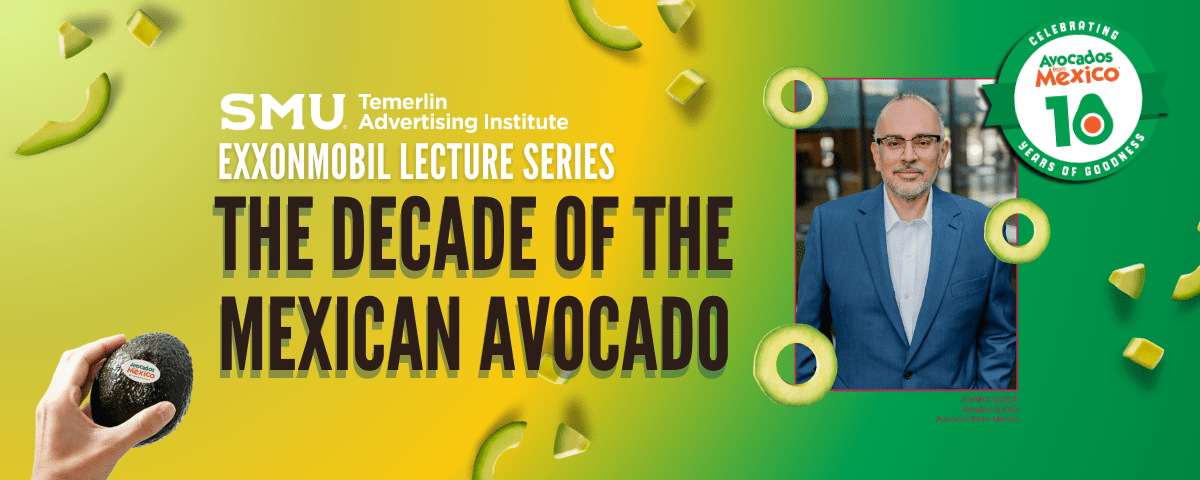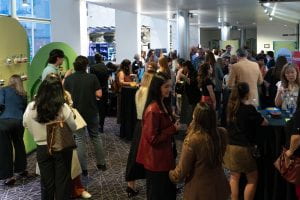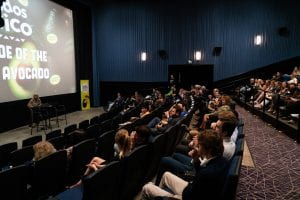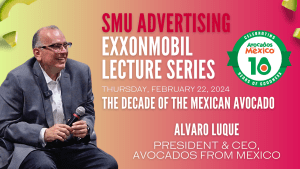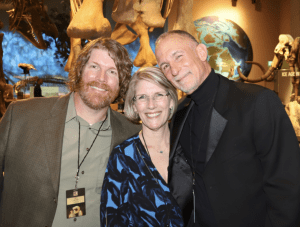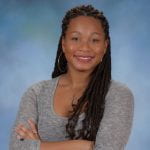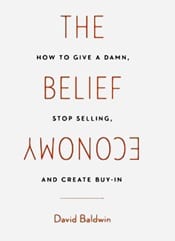On February 22, 2024, Temerlin Advertising Institute at SMU hosted their annual ExxonMobil Lecture Series on Sustainability at the Angelika Film Center in Dallas. This event offered an immersive experience, blending educational discourse with a vibrant networking atmosphere for over 200 students, professionals, and sustainability enthusiasts. All gathered to hear from the man responsible for revolutionizing the avocado market, Alvaro Luque, President and CEO of the non-profit marketing organization, Avocados from Mexico (AFM). The expanding popularity of avocados took center stage as the event seamlessly wove together the threads of sustainability, and marketing innovation. Luque’s insights provided a rich tapestry of his 30-year marketing journey, emphasizing the strategic vision that catapulted Avocados From Mexico to its status as a household name and a symbol of sustainability in the produce market. The night was a great success and we are already excited for next year!
The evening began with a networking hour where guests could connect over drinks, avocado focused hors d’oeuvres and sweets, as well as AFM’s signature build your own guacamole cart. The cart allowed guests to pick and choose their favorite ingredients and experience AFM’s brand message of always good by showcasing how avocados can be delicious, healthy, and fun!
When it came time for the lecture, Luque was an immediate crowd pleaser with his utilization of AFM’s famous jingle to kick things off. His discussion centered on the remarkable journey of Mexican avocados in the U.S., where today, 8 in 10 avocados consumed are from Mexico, contributing over $11 billion in economic output. He went on to emphasize the importance of understanding their target audience and how being the first fresh produce brand to advertise in the Super Bowl played a large part in evening the playing field for them as a brand, increasing awareness in such a large market, and setting a precedent for industry innovation.
At the presentation’s conclusion, TAI’s Dr. Carrie La Ferle went on to engage in a lively Q&A with Luque. La Ferle shared how delighted she was by his genuine care about the next generation, engaging in every question presented, and further sharing words of wisdom with the students in the audience. Dr. La Ferle later stated how impressed she was “by Mr. Luque’s passion for strategy and his keen eye for how to, in the words of Luque, “Make AFM in the produce category, like Pepsi or Coke were to beverages.”
“If you ever doubted the ability to market produce like a CPK, developing a visible brand in a brandless category, doubt no more,” said Dr. Carrie La Ferle of the Temerlin Advertising Institute.
Guests left the evening with more than valuable insights on developing visible brands in brandless categories. Each attendee received a goodie bag which included their very own Avocados From Mexico.
The 2024 ExxonMobil Lecture Series: The Decade of the Mexican Avocado, highlighted the Temerlin Advertising Institute’s dedication to integrating sustainability with marketing excellence and moto of “Better Advertising. Better World.”
Watch the full lecture here:
Previous ExxonMobil Lectures included brands like Publicis, Pepsi Co, Honest Company, Nike, Chick-fil-A, and Monster, features like Signs of Humanity and David Baldwin, and topics like Spirituality.

